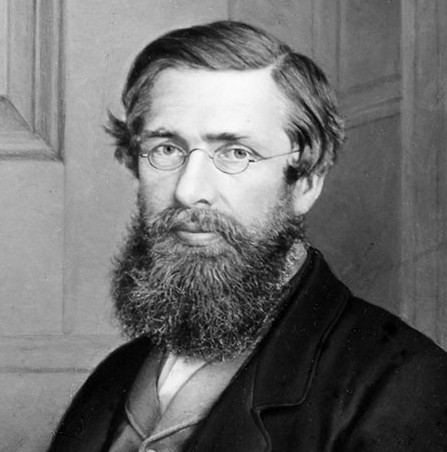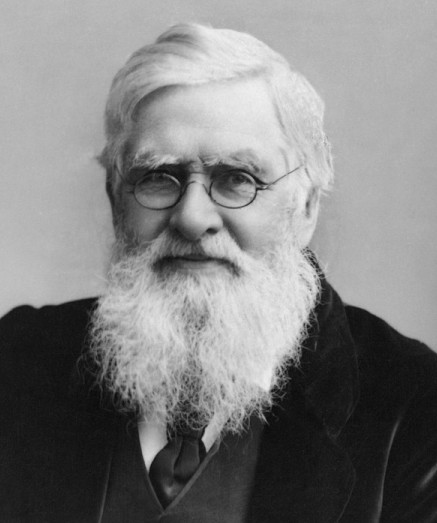Selected Reviews by Subject:- Film, TV, DVDs, CDs, media critics | Health, Medical | Jews (Frauds, Freemasons, Religions, Rules, Wars) | Race | Revisionism | Women | Bertrand Russell | Richard Dawkins | Martin Gardner | H G Wells
Alfred Russel Wallace (1823-1913) lived through Victoria's entire reign, and died before the enormous upheaval of the 'Great War'. He was born in George IV's reign (r. 1820-1830), missing George III and his link with the United States (r 1760-1820, Irish Union, 1801-180). William IV reigned from 26 June 1830 until his death in 1837, when Wallace was about 14. Then of course Victoria reigned until 1901.
Other political events include the unification of Italy (1861) and of Germany (1871). My guess is these were both linked with Jewish money power; unified countries being easier to lend to, and more secure for repayments.
Wallace was younger than Darwin (Charles Robert Darwin, 1809-1882), who died when Wallace was about 60, living for about thirty more years. Despite publications of letters by Victorian scientific gentlemen to each other, Wallace may never have suspected his priority. Darwin certainly had social pre-eminence; it is likely that Darwin was fêted as a very rare type—a rich man who did important work, not a standard rich man merely making money.
Wallace and Christianity agnostic. Disestablishment of church of england (and presumably church of Wales).
Charles H. Smith (Professor of Library Public Information Services at Western Kentucky University, home page https://www.people.wku.edu/charles.smith/wallace/about.htm which contains I think his life work on Wallace) Has assembled a lot of information, tracing Wallace's many articles and letters, at least in English. Smith seems to have been somewhat overtaken by waves of computing improvements. For example, he gives transcripts, sometimes without scanned copies of documents, which are much more reliable as evidence and relatively copyright-free. As far as I know his website is the most thorough on Wallace.
they walked with the free step of the independent forest-dweller, and, except the few that were known to my companion, paid no attention whatever to us, mere strangers of an alien race. In every detail they were original and self-sustaining as are the wild animals of the forests, a
--- noble savage also high opinion of irish, negroes
VOL I
[wonderful century - second half of chapter 19 the vampire of war shows no understanding of parts of nation being able to profit from wars -- like almost all; eg l fry richardson's math ]
VOL II
- flat earth; note law incidents (which sound jewish to me). inc barefaced lies, prolonged timewasting, unpaid bills of house builder turning up for years, jewish-victim-style absurd legal attack -USA including waste and devastation eg old trees/ account of factory style slaughter of pigs/
socialism with no Jews, unlike Russell; he liked Debs, and the Labour Party; Land Speculation and Land Ownership reform but little idea of English people with money funding their projectors, almost unknown to American pioneers; he thought Americans overworked and poor, though talkers regarded as rich
- cp Chomsky on USA as rich/ He looked at the world, just as our legislators do, from the point of view of the employer and the capitalist, not seeing that their prosperity to a large extent depended on the presence of a mass of workers struggling for a bare subsistence
Murphy's weather almanac - wallace thinks 19 year cycle with sun/moon in same place
Boulton and Watt: steam engine new then
1872 to sir charles lyell:---Alfred Russel Wallace: My life. A record of events and opinions.
Reviewed by Rae West/ Revisionist. 3 July 2020. This review is rather sketchy!


Background
A R Wallace was for 120 years considered the co-discoverer of the first workable theory of evolution with Charles Darwin. But in 1980 Arnold C. Brackman's book A Delicate Arrangement: The Strange Case of Charles Darwin and Alfred Russel Wallace suggested, with much evidence, that Wallace had the idea first, writing of it to Darwin almost from the antipodes, giving Darwin time to write out his notes as The Origin of Species. My page includes a detailed chronology extracted from Brackman's book.
Whether Wallace in fact had priority, I'm unsure, though Brackman's account seems convincing to me. It may never be known, or may become a verbal puzzle over word meanings. But Wallace deserves reconsideration. This is the genesis of this review.
**Napoleon defeated about ten years before Wallace's birth - not much evidence of Wallace understanding the 'French Revolution'
And Britain's foreign policies being in the hands of Palmerston, who supplied British simpleton violence cheaply, supporting Jews to force opium onto China. His surname was Temple; William Temple became Archbishop of Canterbury (eventually, in his old age). There is a long-standing link between Jews and churches, though the relative influences fluctuate. Palmerston appears to have been part of the Grand Orient Lodge of Freemasons; probably 'lodge' was taken seriously and allowed for trips and planning.
I'd be surprised if Wallace was aware of much of this.
*savage races - Australia - Eyre in Barbados
*Ireland and Jews Ireland as forced emigration to USA
* US civil war -?to reduce Indians
* Indian and black slaves in Caribbean
Darwin's Origin of Species was published late in 1859. In June 1858, Darwin's 'big book' was 'interrupted' by Wallace's manuscript, said MS, says F Darwin. The priority issue isn't my concern here, however.
My Life: a record of events and opinions
by Alfred Russel Wallace
Two volumes both published in 1905, by Chapman and Hall (London) & Dodd, Mead and Company (New York). I haven't checked subsequent edition and translations.
chap 18 'to the amazon'
Chapters I to XXIV to page 435; then Chapters XXV to XLI up to page 464. Forty page index in Vol II.
What decided our going to Para and the Amazon rather than to any other part of the tropics was the publication in 1847, in Murray's Home and Colonial Library, of " A Voyage up the Amazon," by Mr. W. H. Edwards. This little book was so clearly and brightly written, described so well the beauty and the grandeur of tropical vegetation, and gave such a pleasing account of the people, their kindness and hospitality to strangers, and especially of the English and American merchants in Para, while expenses of living and of travelling were both very moderate, that Bates and myself at once agreed that this was the very place for us to go to if there was any chance of paying our expenses by the sale of our duplicate collections. I think we read the book in the latter part of the year (or very early in 1848), and we immediately communicated with Mr. Edward Doubleday, who had charge of the butterflies at the British Museum, for his advice upon the matter.
-phrenology 1899? the wonderful century has a whole chapter on this. One report 1835 includes a patient J M Generally sane and tractable - Monomania, the Messiah - A proselyte Jews; will lead the Jews to the conquest of England
-education then eg Latin - cp Wells 43 years later
-note on quality of books and facsimile and plates and etchings and very large index
-invasion of phillipines
-spiritualism seems rather simple; one could wish experts in 'magic'
-vaccination
- plants - wallace's capacity to recognise tho unless i missed it he doesn't explain his mental processes -- certain simplicity of the visible; can imagine an experienced person able to know or guess the invisible web of contracts, laws, and threats underling houses, farms, transport, trading
... many pages on these
-evolution in the USA some mention of monkey to man simple creationism. Note on paleontologist rivals. Some hints as to mathematics: eg variability, though this was before stats. But nothing on deaths by other groups, perhaps parasitic, though he was aware of parasitic plants. Before biochemistry, eg nodules fixing nitrogen.

Honeysuckle flower makes rings, presumably visible far away.
-No understanding or mention of Jews, by Wallace
-not much on russia
-paddington green before paddington check rail
-before mechanical transport - cars trucks planes
-too many buildings [around s ken] unreadable quantity of writings
-comments on exams and grade inflation and useless teachers and prob silly pupils
-description of himself and no small talk and apparent rudeness [end of vol i has account of love affair that never was - a review said it might have been omitted]
-lists of contacts; incredible number of still-famous people, and universities and professors, and publications and editors.
:
The Antiquity of Man.} The points that may be more fully treated seem to me to be — 1st, to show in a little more detail that there was such practical freedom of thought in Greek schools and academies ; 2nd, to put forward strongly, the fact that, ever since the establishment of Christianity, the education of Europe has been wholly in the hands of men bound down by penalties to fixed dogmas, that philosophy and science have been taught largely under the same influences, and that, even at the present day and among the most civilized nations, it causes the greater part of the intellectual strength of the world to be wasted in endeavours to reconcile old dogmas with modern thought, while no step in advance can be made without the fiercest opposition by those whose vested interests are bound up in these dogmas.
" 3rd. I should like to see (though, perhaps, you are not prepared to do it) a strong passage following up your concluding words, pointing out that it is a disgrace to civilization and a crime against posterity, that the great mass of the instructors of our youth should still be those who are fettered by creeds and dogmas which they are under a penalty to teach, and urging that it is the very first duty of the Government of a free people to take away all such restraints from the national church, and so allow the national teachers to represent the most advanced thought, the highest intellect, and the purest morality the age can produce. It is equally the duty of the State to disqualify as teachers, in all schools and colleges under its control, those whose interests are in any way bound up with the promulgation of fixed creeds or dogmas of whatever nature.
" I should be exceedingly glad if you could do something of this kind, because I look with great alarm on the movement for the disestablishment of the Church of England, a step which I fear would retard freedom of thought for centuries. This would inevitably be its effect if any similar proportion of its revenues, as in the case of the Irish Church, was handed over to the disestablished Church of England, which would then still retain much of its prestige and respectability, would have enormous wealth, which might be indefinitely increased by further private endowments, and might have a ruling episcopacy with absolute power, who would keep up creeds and dogmas, and repress all freedom of thought and action, and thus do irreparable injury to the nation. Besides this, we should lose a grand organization for education and a splendid endowment which might confer incalculable benefits on society if only its recipients were rendered absolutely free. What might have been the result if, during the last hundred years, the twenty thousand sermons which are preached every Sunday in Great Britain, instead of being rigidly confined to one monotonous subject, had been true lessons in civilization, morality, the laws of health, and other useful (or elevating) knowledge, and if the teachers had been the high class of men who, if unfettered, would have gladly entered this the noblest of professions